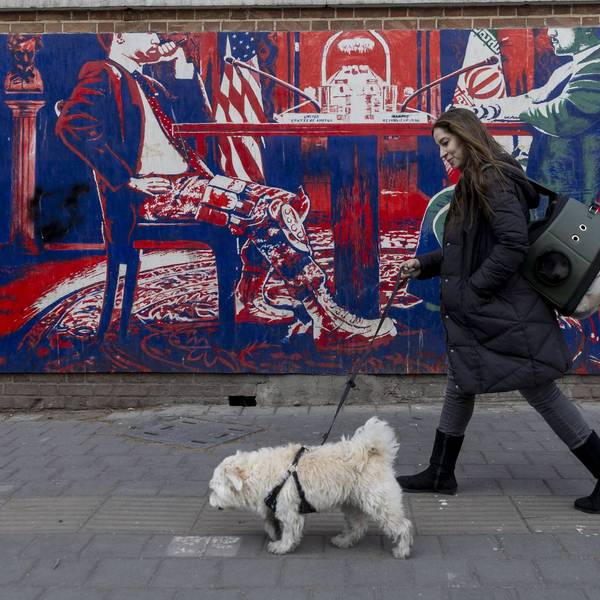Obama has indeed done the right thing to initiate diplomacy with Iran.
Most Iranians, government officials or not, welcome it. However, the present historical moment is still fraught with danger even as it represents the greatest opportunity to date to resolve longstanding US/Iran bilateral issues.
To begin with, Israel does not favor lessening of tensions between the US and Iran.
Heightened tensions serve Israel's strategic objectives well by helping it avert the world's gaze from it's own criminal actions against the Palestinian people including the construction of the illegal "Wall" in the West Bank, the expansion of the illegal settlements on the internationally recognized Palestinian territories, the continued Judaization of East Jerusalem, the illegal occupation itself, and the criminal assault on and the continued brutal blockade against Gaza.
Israel is thus putting maximum pressure on Obama (1) to limit Washington's engagement period with Iran to several months at most, (2) to make the whole endeavor as fragile as possible by continuously beating the drums of war, and (3) to win from Obama a commitment to hard power politics immediately following the hoped-for failure of the diplomatic route.
Furthermore, inside the US, the deservedly ill-reputed neocons and their friends may be out of power but are not out of ideas.
As hawks they still favor "doing" Iran the old-fashioned way -- if you don't mind the canonization of the Bush II's first term. True, the 2008 US elections have limited their power reach inside Washington. But they remain unrepentant in their strategic aims, especially when it comes to Iran. And today's unfavorable political circumstances present them with as yet another challenge to overcome. Need I note that as a group they are not strangers to challenges nor are they known to be challenge-averse.
They acknowledge that Bush II was by and large crippled politically post-Iraq invasion and thus unable to implement sufficiently muscular policies toward Tehran in his second term (as hoped for). Bush II was even unable to let Israel do it. Escalation deterrence simply favored Iran at that time: there was (and is) little guarantee that an Israeli military strike against Iran would not pull the US into the conflict.
Obama however enjoys unprecedented legitimacy at home and abroad and thus say the hawks: "Yes, He Can" take on Iran in a manner that Bush II implied rhetorically but was never able to carry out in deed. All that is needed for the fury of Washington to be unleashed against Iran is the anticipated failure of the diplomatic route. Then once more, the hawks believe, powerful ears in Washington would become more receptive to the counsel of the neocons and their allies.
The Iranian government too is problematic in this respect. It wants normalization of relations with the US but fears that it will weaken its hold on power.
Ironically, in retrospect, the Bush II years may be viewed by Tehran as less challenging to their rule than what may lie ahead for them. During that period Washington and Tehran militarized their policies at home and abroad while they cooperated tactically in Afghanistan and Iraq where their interests coincided.
More decidedly for ordinary Iranians, the unfortunate militarization turn meant that the Tehran government was now more able to suppress the many courageous civil and political society movements arising from among the young, the women, the students and the workers of Iran, movements that had been maturing ever since the mid-1990s. Indeed one may contend that the Washington-Tehran Axis of Neoconism boded ill for all concerned.
At any rate, Tehran is ill-advised to think that the status quo of No-War-No-Peace is a viable option. This may prove to be a costly illusion. When and if the brief period of diplomacy ends without "success," Washington policy is sure to swing towards hard power choices, and only this time it will be backed by the legitimacy afforded to Obama owing to the historic 2008 US presidential election and the appearance of Washington having had exhausted diplomacy.
Logic demands that Tehran prod Obama to take bolder and more substantive steps towards rapprochement with Iran (like unfreezing of Iran's assets, easing of unilateral sanctions, etc.). This should become the number one national security policy priority of Tehran in the post-presidential elections of June 2009. Tehran ought to note that Obama is a centrist politician who is facing growing pressure from the right on Iran policy and that he is likely to heed more hawkish counsel of those around him like Dennis Ross and even the Sec. of State Hillary Clinton if the window of opportunity that exists today shuts owing to lack of decisive action from Tehran.
But this is a challenge that requires the rulers in Tehran retreat from their militaristic and repressive policies as well. No policy change would be more welcome by ordinary Iranians than Tehran embracing democratization and favoring broad participation by those it has unwisely excluded from politics so far.
Indeed just this week the most prominent among Iran's opposition figures and groups joined together and announced the creation of a new political formation called Solidarity for Democracy and Human Rights (hambasteghi baraye democracy va hoghough-e bashar). It seeks non-violent changes based on the adherence to democratic principles and rights including those expounded in the Universal Declaration of Human Rights.
If as cosmopolitan progressives we urge Washington to change the mindset that leads it to ruinous wars, then we must also join in solidarity with those inside Iran and demand that Tehran retreat from its exclusionary and repressive political practices.
These are times that call for boldness on all sides.



